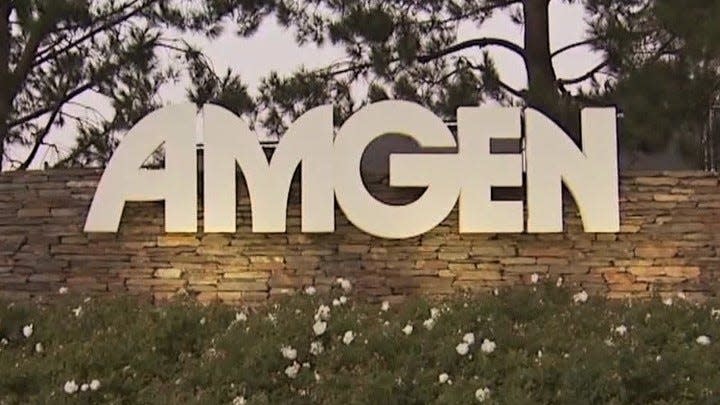Amgen acquires Horizon Therapeutics for $28B in biggest health care industry deal in 2022

Amgen announced its biggest acquisition ever on Monday, and the biggest deal this year in the health care and pharmaceutical industries: a $27.8 billion cash purchase of Horizon Therapeutics, a biotechnology company that has developed a number of treatments for rare diseases.
Amgen is based in Thousand Oaks and is one of Ventura County’s biggest private employers, as well as one of the world’s largest biotech companies. It has been on bit of a buying spree in recent years, with four other acquisitions in 2021 and 2022, but the Horizon deal is by far the largest.
Amgen will pay $116.50 per share for Horizon, which is based in Dublin, Ireland, but has a number of offices in the United States and trades on the Nasdaq stock exchange.
That price is almost 20% above Horizon’s closing price on Friday, the last trading day before the deal was announced. It also represents a premium of nearly 48% over Horizon’s $78.76 closing price on Nov. 29, before Horizon disclosed it was the target of potential acquisition offers by Amgen and two other pharmaceutical companies.
In a conference call Monday morning, Amgen CEO Robert Bradway said the opportunity to buy Horizon was “compelling both strategically and financially.”
“We've admired Horizon's success for some time and we've studied their business closely through time as well, and when presented with this opportunity we were prepared to move quickly,” Bradway said.
Salim Syed, an analyst at the investment bank Mizuho Americas who covers Amgen and other biotechnology companies, said he thinks the deal makes sense for Amgen. Though the price is nearly 50% more than Horizon’s recent stock value, it is still a little below where the company was trading in April, he pointed out, and the value is in line with other recent mergers in the industry.
Syed said this deal likely represents the peak of Amgen’s current acquisition spree, since any company is unlikely to take on two deals of such size in quick succession. Amgen is likely to keep making smaller acquisitions, he said, because it needs to make up for the revenue it is likely to lose as its current blockbuster drugs get older and lose their patent protections.
Amgen’s revenue in 2021 was just under $26 billion, and Syed said about 40% of that is “exposed,” which means it comes from products that are scheduled to lose patent protections by 2030.
“Acquiring a company like Horizon Therapeutics fills a substantial part of that void,” Syed said, with Horizon expected to contribute at least $5 billion to Amgen’s revenue.
Amgen’s offer is all cash, and the company said in Monday’s news release that it had already secured $28.5 billion in financing from Bank of America, Citibank and other lenders.
The boards of directors of both companies have approved the deal, Amgen said. It still needs a full shareholder vote, as well as approval by U.S. and European regulators.
Amgen executives said Monday they do not expect any major regulatory hurdles and expect the deal to close sometime in the first half of 2023.
Horizon has a few drugs already on the market for rare autoimmune and inflammatory diseases, and more in its research pipeline. Three of its current drugs combined for $2 billion in sales in the first nine months of 2022, Bradway said in Monday’s conference call.
The biggest of those drugs, Tepezza, accounted for about $1.5 billion in sales in the first nine months of this year. Tepezza is the first approved treatment for thyroid eye disease, an inflammatory eye disorder than can cause vision loss. It was approved for sale in the U.S. in January 2020, and in the most recent fiscal quarter, its sales were up 37% over the previous year.
Horizon’s other drugs include Krystexxa, a treatment for chronic refractory gout, and Uplinza, a treatment for a rare and serious autoimmune condition called neuromyelitis optica spectrum disorder.
Bradway said Horizon’s drugs are “complementary to Amgen's portfolio” and “squarely within our wheelhouse.”
“Each has been delivering strong volume-driven growth, and each is still early in its life cycle,” Bradway said. “This allows shareholders of Amgen an opportunity to participate in the long-term growth of these products.”
Because Amgen already produces drugs for autoimmune and inflammatory conditions, the CEO said the company can use its existing manufacturing and distribution networks to enable Horizon’s treatments to grow faster than they would if the company were to remain independent.
“We have decades of experience, and we know the science, we know the customers, and we think that there is an additional benefit and fit given the therapeutic areas that these products address,” he said.
Syed said he thinks Amgen and Horizon have just the right amount of overlap – enough so that Amgen has expertise in Horizon’s specialty area of inflammation treatments, but not so much overlap that a government regulator would want to block the deal out of concern over possible monopolies.
Amgen did not announce specific plans for integrating Horizon into its business, or whether the combined company would be subject to any downsizing. Peter Griffith, Amgen’s chief financial officer, said during the company’s conference call that he expects “annual pre-tax cost efficiencies of at least $500 million” by the third year after the transaction closes.
Horizon shares shot up about 15% after the deal was announced Monday morning, and closed the day at $112.36. Amgen’s stock closed Monday at $276.78, down just 0.7% from the previous trading day.
Tony Biasotti is an investigative and watchdog reporter for the Ventura County Star. Reach him at tbiasotti@vcstar.com. This story was made possible by a grant from the Ventura County Community Foundation's Fund to Support Local Journalism.
This article originally appeared on Ventura County Star: Thousand Oaks' Amgen to buy Horizon Therapeutics for $28B
